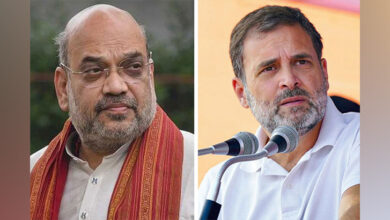G-20 approves communique after compromise on war language
The group is deeply divided over the war in Ukraine, with Western nations pushing for strong condemnation of Russia in the Leaders' Declaration, while others are demanding a focus on broader economic issues.

New Delhi: Group of 20 leaders agreed on a joint statement after resolving final differences over references to Russia’s invasion of Ukraine and US plans to host the annual summit in 2026.
The final communique released Saturday retained the language on the war reported earlier by Bloomberg News. It reflected a compromise between the US and its allies, which had sought tougher words to denounce Russia, and Moscow.
The agreement allowed host India to claim a diplomatic success from the meeting, a key showcase for Prime Minister Narendra Modi.
“This is a complete statement with 100% unanimity,” said Amitabh Kant, India’s top G-20 negotiator. “This demonstrates both the prime minister’s and India’s great ability to bring all developing countries, all emerging markets, all developed countries, China, Russia, everybody together on the same table and bring consensus.”
This year’s text version includes language on Russia’s invasion of Ukraine – broadly similar to that in last year’s – that would allow both sides to claim a diplomatic victory.
“This is a significant milestone for India’s chairmanship and a vote of confidence that the G-20 can come together to address a pressing range of issues, and also to deal with hard issues that actually very much divide some members from others including, obviously, Russia’s brutal war against Ukraine,” US National Security Advisor Jake Sullivan said.
The US and its allies had sought tougher phrasing than the Bali compromise to denounce what they see as Russia’s aggression, while Moscow wanted to weaken the reference — and for a time enjoyed the support of China. Presidents Vladimir Putin and Xi Jinping both skipped the New Delhi summit, however.
The main difference in the text agreed to this year is the removal of most phrasing that expressed divergent opinions over issues such as sanctions and direct condemnation of Russia’s war, replacing it with unanimously supported views backed up with references to United Nations principles.
Disagreements over the phrasing had threatened to derail efforts to produce an agreed communique. Diplomats worked nearly around the clock in recent days to hammer out the text. Host country India had pushed to ensure a deal was reached, participants said.
The Ukraine references are a relatively small part of the document, which covers issues from the global economic outlook to climate change.
The text warns that “cascading crises” have posed challenges to long-term economic growth and calls for coordinated macroeconomic policies to support the world economy. It warns that uncertainty on the economic outlook remains high and the balance of risks is tilted to the downside.
The G-20 agreed on measures to expand lending by multilateral institutions like the World Bank. Indian Finance Minister Nirmala Sitharaman said the steps could yield as much as $200 billion in extra funding over a decade.
China dropped initial resistance to language on climate change, diplomats said.
The final text also mentions US plans to host the G-20 summit in 2026, something that Beijing had initially questioned.




